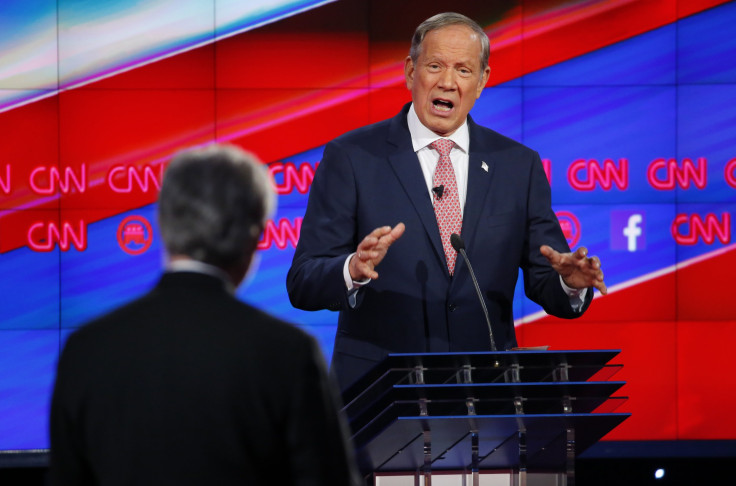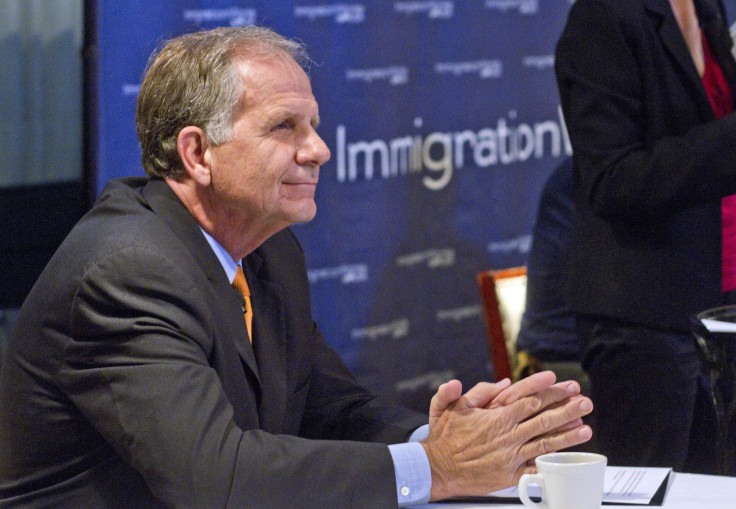Republican Presidential Hopefuls Target Encryption And Silicon Valley In CNN-Facebook Debate On National Security

They were surrounded by Facebook logos on stage in Las Vegas, Nevada, but to hear the Republicans tell it, Facebook and other social networks like it, need to open their code to the U.S. government in its battle against terror. Facebook, ostensibly the co-host of this debate with CNN, is a crucial campaiging tool and a funnel for their ad dollars, but it also became a target on Tuesday, along with other tech companies that build encryption and privacy into their products.
National security was the topic Tuesday night, and the 13 Republican candidates across both the undercard and frontrunner debate showed great unanimity on one theme: that the U.S. government should have greater powers when it comes to prying into digital communications.
Republican presidential contender and former Hewlett-Packard CEO Carly Fiorina used her time on the debate stage to call for Twitter, Snapchat and “all the rest of it” that “has only been around a couple of years” to further work with the government. These technologies, she argued, did not exist when the Patriot Act was first passed in the wake of 9/11 and policy hasn't kept up.
“I offer myself as a leader of this company because I think they’re looking for a solution,” Fiorina said on the main stage. “Number one we need to recognize that technology has moved on.”
Fiorina mentioned Snapchat and Twitter and the 'rest of em.'
Guess the rest of 'em includes Facebook, who is a partner for this #GOPDebate.
— Tariq Ahmad (@tariq_ahmad) December 16, 2015While Fiorina may be polling near the bottom of the field, she is the only on the stage with significant experience in technology as the former CEO of Hewlett-Packard. She cited the invention of the iPhone and iPad as transformative, but also tools that could be used by terrorists since they are impenetrable by law enforcement. “They must be engaged," she said of the tech industry. "They must be asked. I will ask them. I know them."
Ohio Gov. John Kasich named encryption as “the enemy.” Real estate mogul and TV personality Donald Trump suggested blocking or limiting the Internet, which Sen. Rand Paul was adamantly against: “Like they do in North Korea? Like they do in China?” Paul asked in his opening speech. Rick Santorum, former senator from Pennsylvania, highlighted the need for more data and more algorithms in the earlier debate.
Renewed attention on Silicon Valley comes as more was learned this week about San Bernardino shooter Tashfeen Malik’s use of technology, notably Facebook, to spread extremist messages and communicate with jihadists. Those actions occurred prior to the Dec. 2 attack where 14 Americans were killed and prior to her entry into the U.S. on a visa. The Department of Homeland Security admitted that reviewing social media accounts was not part of its background check.
Several of the questions from CNN moderators during the early and late debate centered on what should be done, including how social networks and the government should combat terrorism. For instance, in the early debate, CNN’s Wolf Blitzer asked, “As president of the U.S. would you force these companies to change their practices?”
As the contenders approach the primaries, they are vying for public approval and money, and Silicon Valley is a significant source of political fundraising. Sen. Marco Rubio, R-Fl., was pulling in the most donations from tech companies, as of October, according to Crowdpac, a nonpartisan tech startup that analyzes data on contributions to candidates and their super PACs.
Demands For New Legislation
President Obama and Democratic frontrunner Hillary Clinton have not put forth legislation since the recent terrorist attacks, but they have suggested a closer working relationship with tech companies is necessary. Facebook told IBT that the company aligned with the administration’s mission against terrorism and would agree to such meetings.
Tuesday night, Republican presidential hopefuls offered strategies well beyond a conversation.
Several candidates, including Gov. Mike Huckabee and Fiorina, criticised the Department of Homeland Security for its failure to check the San Bernardino shooter’s social media accounts. “Every college kid that gets drunk and goes on Facebook has a potential employer look at,” Huckabee said. “It’s the duplicity of our policy that is illogical and irrational.”
“For heaven-sakes every parent in America is checking social media,” Fiorina said. “The government has become incompetent, corrupt … That has become dangerous.”
A bill, sponsored by Rep. Ted Poe, R-Texas that called for closer monitoring of social media in efforts against terrorism passed the House of Representatives earlier on Tuesday.

Despite the introduction over two months ago, the bill did not enter the floor until a week after U.S. Sens. Dianne Feinstein, D-Calif., and Richard Burr, R-N.C., introduced a separate bill that would require social networks to report suspected terrorist communications to authorities. Presidential candidate Rubio was the only additional sponsor.
Sparring Over Metadata
Republicans also debated the collection of so-called "metadata" from wireless companies, a policy which changed last summer after exposure by whistleblower Edward Snowden. The USA Freedom Act, which mandated that phone records of U.S. citizens could no longer be directly pipelined from service providers to the government, went into effect last month.
Rubio defended the old collection program at the debate. “The next time there is an attack in this country, the first thing people are going to want to know is why didn’t we know about it,” Rubio said. “The answer better not be because we didn’t have access to records.”
"This is why I own a flip phone," Sen. Lindsey Graham, R-S.C told Wolf Blitzer at the earlier debate. “If somebody is on the other end of the phone, don't you want to know who they’re talking to?” he said. “We're at war folks. They're not trying to steal your car. They're trying to kill us all. So yes, I would re-institute this program.”
Paul fought back saying that such a program made Americans “less safe.”
New York governor George Pataki suggested creating backdoor policy, a system that grants the government immediate access to tech companies’ data. Such a system has been aggressively opposed by Silicon Valley and cybersecurity experts.
“We need a backdoor,” Pataki said. “We must do everything in our power.”
Kasich mentioned encryption in the debate and seems to have supported a backdoor policy during the debate, as well. Yet, he has previously had come out against the idea.
FACT CHECK —> Kasich has also voiced skepticism toward a “back door” for consumer data and support for encryption. pic.twitter.com/kIWvKEg1nJ
— Crowdpac (@Crowdpac) December 16, 2015Tech companies are battling these efforts behind the scenes, careful to not look uncooperative in the war on terror but wanting to defend the rights of their users. “Our priority is keeping our users safe, and back doors make them more vulnerable," an employee of a public U.S. social networking company who was not authorized to speak on the record told IBT in November shortly after the attacks in Paris.
Lance James, chief scientist at Flashpoint Global Partners, a research and analytics company focused on security, compared such a request to banning gloves in America.
“Gloves in general are utilitarian, but we have some people who will kill someone with a glove,” James said. “We don’t ban the gloves because somebody committed a crime with them. It’s not the tool that’s the problem.”
© Copyright IBTimes 2025. All rights reserved.





















